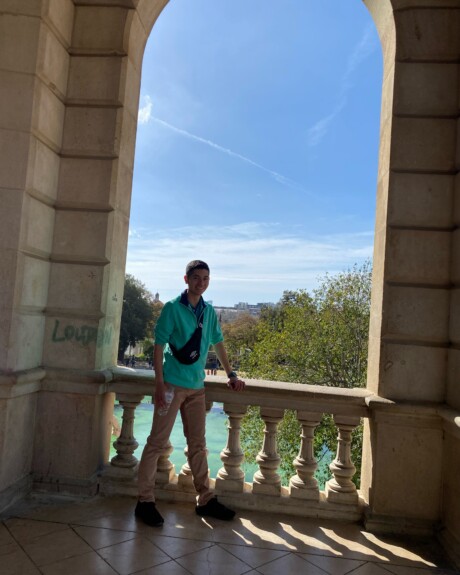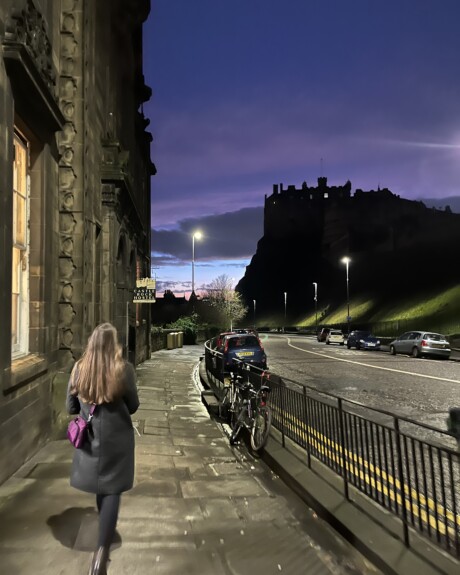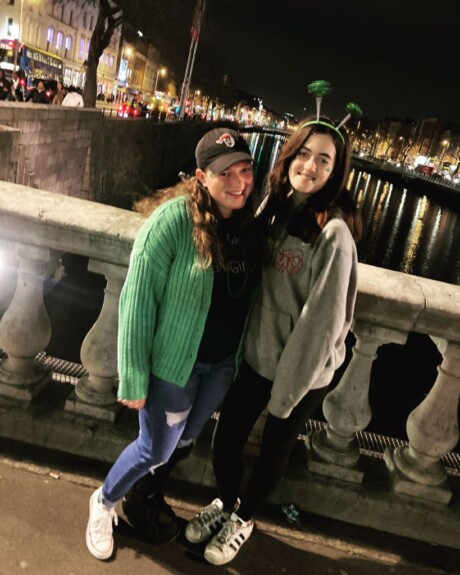
I chose to participate in the Barcelona Food & Culture Preview because I had the opportunity to learn about another country and then travel with a great group of students. Visiting another country is definitely a once in a lifetime experience in which every moment is extremely special. I met new friends and having two very wonderful instructors!
Danny Ponciano

My favorite part of my Edinburgh Preview class was getting to connect with a group of people with similar interests I would not otherwise have met. I am a senior now and I still keep in touch with friends I met in my preview class! Our instructors elevated this class beyond expectations both inside the classroom and on the trip. The staff are just as excited to go on the trips as the students are!
Aoife Samuelson
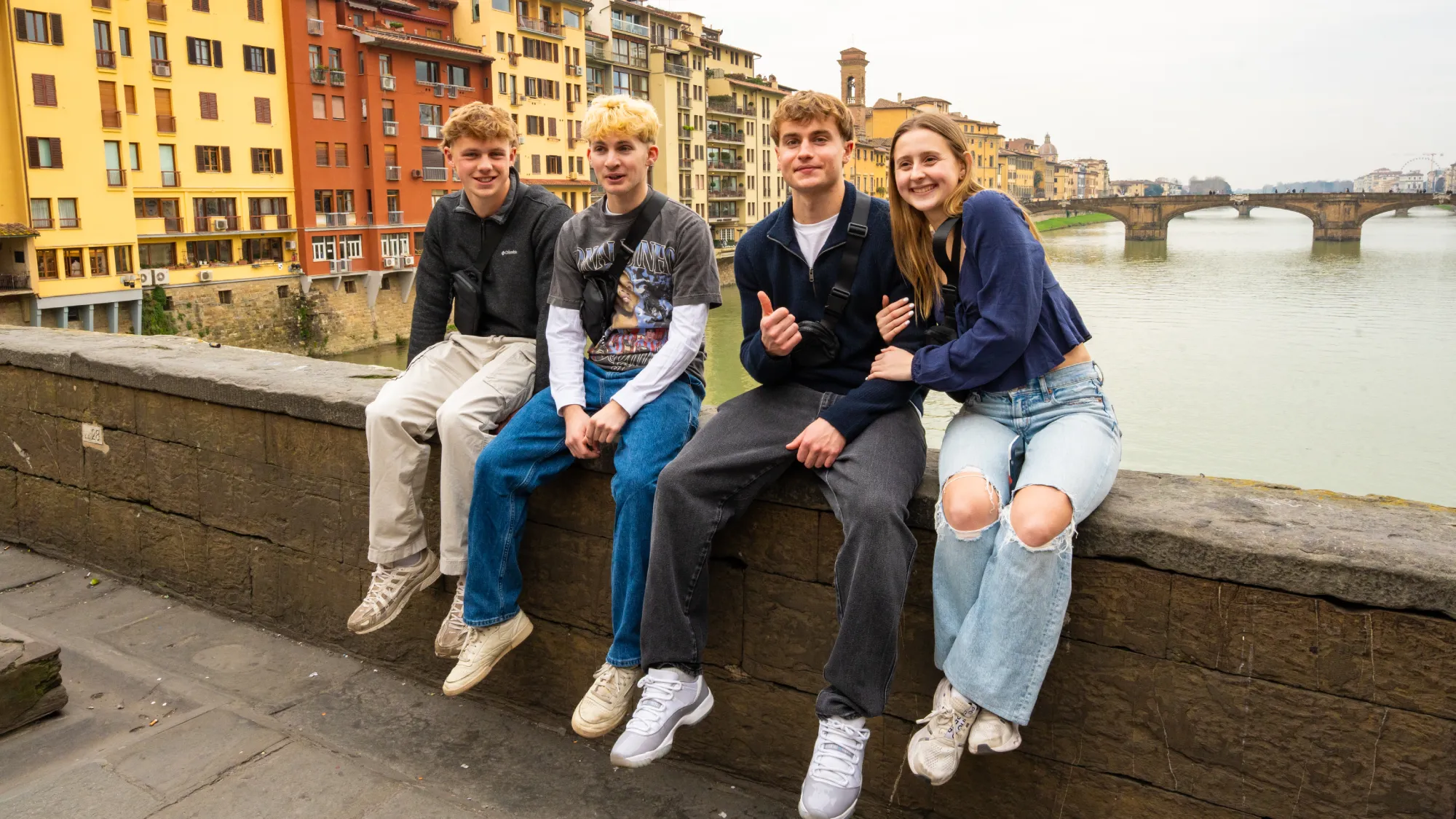
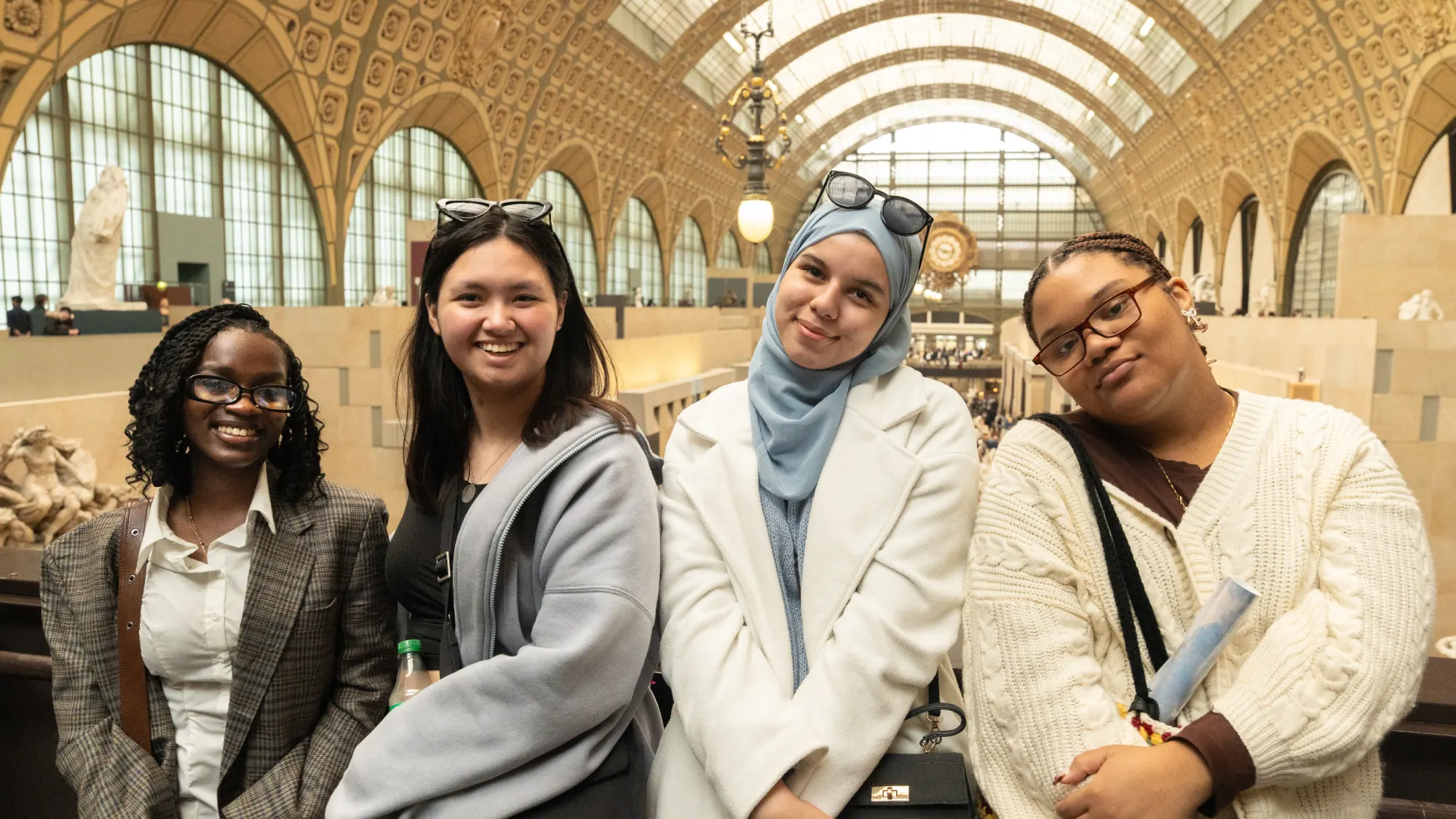
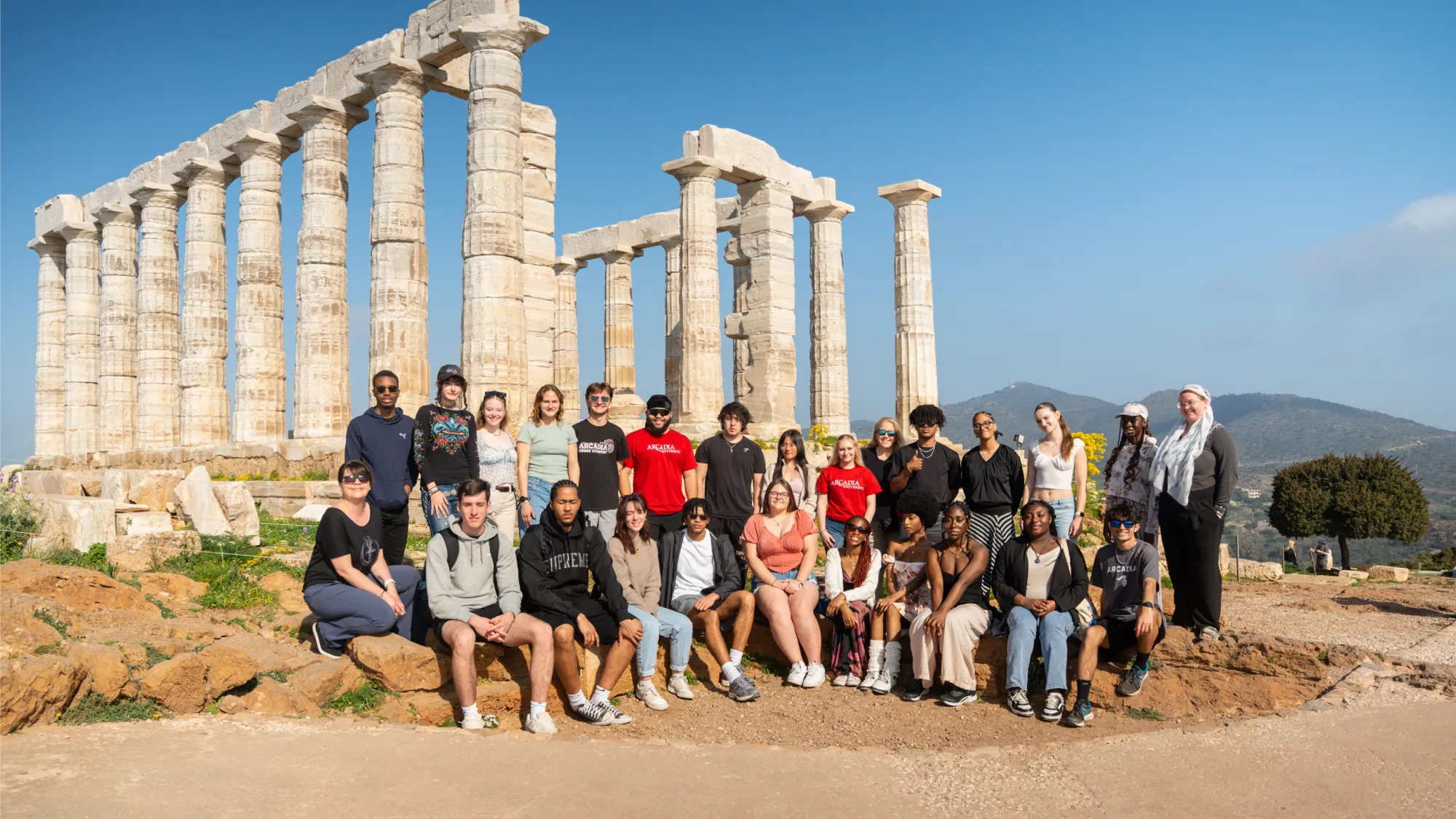
Preview the World Course Listing Notes:
- Application: Preview courses are not open to direct registration. Students must submit an application and meet other eligibility requirements. Apply by going to your MyKnight portal and selecting “My Global Opportunities” in the top navigation bar. Once you complete the initial application questions, you will be directed to the Arcadia Abroad Portal where you will be asked to submit a copy of your passport and take a health survey. Please allow at least one hour for your checklist items to appear in the ArcadiaAbroad Portal after submitting the initial application. If you have questions, please contact globalengagement@arcadia.edu. The application generally opens the day after the Study Abroad Fair in mid-September and closes ten days later (please see your email for specific dates and instructions).
- Courses: Please scroll down for a full list of courses. In your application, you will be asked to select your top four preferences so please review these offerings carefully.
Spring 2026 Offerings
BBQ: America’s Favorite Cuisine - Austin, Texas (USA)
Instructor: Marc Brasof
Meeting Time: Friday 2.45 - 4.45
Description: Studying the intersection of food and culture involves analyzing how food practices and traditions are deeply intertwined with a community's cultural identity, history, social structures, and geography. We will examine barbecue as a ‘foodway’ to understand the social contexts that make it such important cuisine in the United States (and elsewhere)—for BBQ is truly communal and inseparable from the American experience. In this course we will not only explore the whys of BBQ; as a group, we will learn how to cook it—students will have an opportunity to become novice pitmasters and/or certified to run a restaurant, culminating in a BBQ cookout for the university! Additionally, we will explore the music and food-rich city of Austin, Texas during the travel portion of the course, which has become one of the most important and diverse centers of BBQ in the world. There, we can explore diversity of food and culture that makes BBQ such a culturally adaptive cuisine.
Sustainability and Spirituality in Bali Indonesia - Bali, Indonesia
Instructors: Jennifer Riggan
Meeting Time: Thursdays 4:00 - 6:00 p.m.
Description: This course examines the intersection of sustainable tourism and spiritual practice from the perspective of Bali, an island in Indonesia. Sustainability is a major global challenge for human societies. Bali is a perfect-fit to explore themes in sustainability because it is at a critical turning point in its development: trying to balance tradition and modernity, cultural sustainability and economic advancement. Principles of Balinese spirituality provide an alternative way of thinking about spirituality. During our course, Bali is our “living classroom” where we examine the ways that individual, community, and environmental well-being are intertwined and connected to global economies and local ecologies. The centerpiece of this year’s course will focus on the unique cultural practices of the Balinese New Year (Nyepi). Known as the “day of silence” during Nyepi, there is no music, transportation and people do not leave their houses in order to engage in silent contemplation. Learning about and practicing this form of spirituality alongside the Balinese people, will radically reorient students’ understandings of what it means to be a tourist. We will also explore Bali’s unique approach to sustainability through interactions with the island’s NGOs and cultural organizations. Students also visit revered Balinese temples, explore sustainability in a national park, snorkeling over coral restoration sites, and speaking with a member of the Balinese royal family.
Cultura y Comida: Food Culture in Barcelona - Barcelona, Spain
Instructors: Ashley Knueppel & Cheryl Lewis
Meeting Time: Tuesdays 4:00 - 6:00 p.m.
Description: “Food is of and from a place; it needs a context to give it authenticity.” - food and wine authority, Colman Andrews
Food plays a crucial role in cultural identity; it is one of the strongest identifiers of place and home. In this sense, it is also an excellent way to learn about and truly experience a culture through every sense. Barcelona has a rich history and connection to food and is globally recognized for its bustling food scene.
The course takes students on a deep dive into Barcelona food which has been influenced by its history and culture. Together we will experience how cuisine, cooking, eating and food-related practices, traditions and rituals can be used as vehicles for understanding a culture and society - especially in a globalized world. We will treat the classroom like a dinner table - a place to come together and foster discussion with respect. Topics to be covered include a basic history of Barcelona and representative foods; the effects of colonization, immigration and ethnic enclaves; cultural identity and food rituals; social and environmental responsibility and sustainability efforts; and food tourism.
We’ll put this learning into action with our Preview travel week itinerary. Highlights include: multiple walking tours, tapas tasting, cooking class, vineyard and farm visits, market tours, and a visit to the iconic Sagrada Familia Basilica.
Ecotourism & Sustainable Development in Costa Rica - Costa Rica
Instructors: Ryan Genova & Charlene Bauer
Meeting Time: Wednesdays 2.45 - 4.45 p.m.
Description: This course will explore the image of Costa Rica as a leader in the global ecotourism community. As Costa Rican tourism of all kinds has significantly increased over the past two decades, surrounding controversy has begged the questions: Is de facto ecotourism a sustainable practice, and can conservation and economic growth truly go hand in hand? We will focus on the role and polices of the Costa Rican government in managing the private sector, protecting the country’s biodiversity and natural lands, and its historical responses to criticisms levied by environmentalists. We will have the opportunity to learn from local sources, participate in sustainable practices related to Costa Rica’s ecosystem and local population, and visit some of the northern region’s most exotic landscapes. Students will depart San Jose with an increased awareness of natural preservation, the growing demands of the tourism industry, and the cultural integrity of the local community.
Dark Dublin: Exploring Ghost Criminology and Dark Tourism in Dublin - Dublin, Ireland
Instructors: Favian Martin & Anthony Reyes
Meeting Time: Mondays 2:45-4:45 p.m.
Description: Step into the shadows of Dublin—a city where every cobblestone seems to whisper stories of rebellion, tragedy, and the supernatural. This immersive course invites students to explore the booming world of dark tourism through the lens of Ghost Criminology, Irish history, and literature. Together, we’ll investigate how stories of death, violence, and trauma are retold, commodified, and reimagined in the modern world. From 19th-century grave robbers and cadaver trafficking to the ghosts of Kilmainham Gaol and the fiery legend of Darkey Kelly—Ireland’s infamous alleged witch and first female serial killer—students will dive deep into the city’s macabre past. We'll also examine pivotal moments like the 1916 Easter Rising and consider how personal, political, and cultural forces shape what is remembered—and what is forgotten.
Grounded in cultural criminology, this course offers a unique opportunity to deconstruct the ethics and impact of telling dark stories. Through readings, discussions, and real-world site visits, students will analyze how history, myth, and marketing converge in the rise of dark tourism.
As the highlight of the course, students will travel to Dublin, where they’ll explore iconic and eerie landmarks including Kilmainham Gaol, Glasnevin Cemetery, the vaults of St. Michan’s Church, the GPO Museum, and Dublin Castle. The experience culminates with a guided ghost tour of the city, offering firsthand insight into how these haunted narratives are brought to life for modern audiences. Whether you’re passionate about crime, history, folklore, or cultural storytelling, this course offers an unforgettable journey into the haunted heart of Ireland.
Wherever Green is Worn: Modern Ireland Through History and Tradition - Dublin, Ireland
Instructor: Tim Barton
Meeting Time: Fridays 2:45-4:45 p.m.
Description:
While the whispers of ancient stone walls and the warmth of friendly faces certainly endure, Ireland is much more than a postcard of rolling green fields and ancient lore. Modern Ireland is a vibrant tapestry woven from tradition and exhilarating transformation. This course invites you on an unforgettable journey to uncover what it truly means to be Irish today, showcasing the captivating interplay between its pulsating urban centers and the timeless serenity of its inspiring countryside. We'll trace Ireland's compelling journey from its mythical Celtic origins, plunge into the rich literary heart in its capital city, and confront the continuing, vital narrative of Northern Ireland. Prepare for an utterly immersive experience: stroll the historic, bustling streets of Dublin, breathe in the salty air of a picturesque coastal village, step inside the very halls of the Irish Parliament, explore the resilient spirit of Derry, and find reflective solace amidst timeless Celtic ruins nestled deep within the Irish countryside. Join us to discover firsthand why this small, powerful island doesn't just hold history, but actively captivates the hearts and minds of 80 million people across the globe.
Hard Men: Deconstructing Scottish Masculinity - Edinburgh, Scotland
Instructors: Daniel Pieczkolon & Jess Derr
Meeting Time: Fridays 2:45-4:45 p.m.
Description: For decades, Sociologists have been reminding us that “gender is a social construct,” but how do different societies construct gender differently? How do factors like geography, economics, cultural history & representation, and so many more combine to inform our (mis)understanding of gender? This course provides students the opportunity to examine the cultural stereotype of the “Scottish Hardman” in contemporary Scottish fiction in an attempt to understand its root causes & material effects. To help us better understand the fiction, we will use academic essays, short films, personal reflection/refraction, classroom discussion, and experiential learning (in Edinburgh & Glasgow) to explore how masculinity reproduces itself—often to the detriment of other genders, society at large, and even those who benefit from it in some capacity.
Ciao! STEM innovations and culture in Florence, Italy - Florence, Italy
Instructors: Dr. Augusto Macalalag & Dr. Kim Dean
Meeting Time: Fridays 2:45-4:45 p.m.
Description: The city of Philadelphia played a pivotal role in shaping the development of a new democracy, while the city of Florence played a role in the initiation of the Italian Renaissance. Both cities are steeped in scientific discovery and the advancement of their respective countries. In this course, students identify and examine the scientific pioneers, their discoveries and developments, and how the local culture and society fostered their work. Student participation in a variety of discussions and field explorations in Philadelphia, Pennsylvania and Florence, Italy introduces them to the interplay of science, society, and culture of two historic and well-known cities. Examples of field study include Brunelleschi’s discovery of linear perspective and its use in art, the invention of mechanical devices for building construction and used in erecting the dome of the Florence cathedral, Leonardo da Vinci’s machines, Benjamin Franklin Museum visitation, Benjamin Franklin’s many inventions such as the lightning rod for safety, and Galileo’s discovery of the Laws of Motion and his development and use of the telescope to advance astronomy. Students will also explore the societal and political contributions of Benjamin Franklin and the Medici Family in the technological advances made during the Italian Renaissance and Colonial America. Finally, this course will examine the scientific triumphs of Philadelphia and Florence, but also encourages students to explore who benefited, who was excluded, and how these advancements intersected with social justice issues of the time. By examining the power dynamics, marginalized voices, and lasting impacts, students gain a richer understanding of science within its historical context.
Lost & Found: How EcoArts Reconnect Us to the World - Glasgow and Edinburgh, Scotland
Instructors: Ellen Skilton & Monica Day
Meeting Time: Thursdays 4:00 -5:45 p.m.
Description: Explore Scotland’s rural countryside and two of its most important cities using art, and especially EcoArt, as a lens to engage in possibilities for engaging with current realities and imagining different futures. We will get up close with rivers in both Philadelphia and Scotland and explore race and class dynamics in arts and climate justice across contexts. Designed for artists and non-artists alike, this course explores the role of art and imagination in addressing climate change. Students begin by responding visually and in words to their own relationship with nature, developing a deeper understanding of the connections between themselves and their environment, and learning new ways to express this connection and generate awareness, commitment and momentum for the climate conversation. Alongside their personal exploration and creative responses, students will engage with environmental art, artists, and city planners from around the world, and with movements such as EcoArt and Biomimicry. We will connect our own interests and creativity with community artists and projects in the Scottish Borders, Glasgow, and Philadelphia as a way of mapping our collective way forward.
Iceland: The Land of Fire and Ice - Reykjavík, Iceland
Instructors: Kim Small & Tatjana Miletic
Meeting Time: Fridays 2:45-4:45 p.m.
Description: Discover the unique natural and cultural landscape of Iceland, where geological wonders, historical heritage, and artistic experiences come together. Iceland was settled around 870 AD by Norse and Celtic populations, making it one of Europe’s last inhabited islands. First recorded by Viking explorers in the 9th century, it became a Norwegian province in the 13th century and later came under Danish rule. Iceland gradually gained autonomy in the 19th century, declaring itself an independent republic in 1944. Reykjavik, the lively capital city powered by geothermal energy, is home to museums that celebrate and preserve the nation’s rich Viking history. Beyond the city, Iceland’s breathtaking scenery unfolds — a dramatic landscape shaped by volcanoes, geysers, hot springs, glaciers, black sand beaches, and expansive lava fields.
Germany: Gorgeous & Grimm - Munich, Germany
Instructors: Rhianon Visinsky & Allyson McCreery
Meeting Time: Fridays 2:45-4:45 p.m.
Description: This Preview will examine the literary, architectural, and landscape intricacies of the region of Bavaria in southern Germany. We will explore the “Gorgeous & Grimm”--the stunning architecture and landscape that inspires many of the fairy tales shared by the Brothers Grimm. The experiential learning component of this course will explore the storied landscape of Germany as it offers unique insight into the ways that landscape and architecture influence fairy tales and allow us to create, modify, and commodify them for our own purposes of education and enjoyment.
Empire’s Echo - London, England
Instructors: Alisha Divis & Bre Donnelly
Meeting Time: Thursdays 4:00 - 6:00 p.m.
Description: Once arguably the “mightiest” Empire of them all, the legacy of the British Empire includes wide ranging implications on what it feels to truly belong to one’s society and culture. British imperialism fundamentally altered the demographic and cultural landscape of London. The influx of people from the colonies and former imperial territories into London created a diverse and multicultural city. However, alongside this diversity, there were also divisions and tensions based on race, class, and nationality. The experience of living in imperial London influenced individuals' identity development in profound ways. As a class, we will work together to better understand the complexities of British society and culture, spanning historical events, social movements, and contemporary issues. The course encourages critical thinking, cultural awareness, and a deeper appreciation for the diverse narratives that contribute to the fabric of British identity. Our adventure together in London, will allow us to discover the real city outside of the square mile to learn the very different story that neighborhoods tell about history, identity, and the mirage of the crown.
Rhythm & Culture: Exploring Music and the Arts in London & Philadelphia - London, England
Instructor: Stephen Tyson Jr., Ed.D.
Meeting Time: Mondays 4:00-6:00 p.m.
Description: How do Philadelphia and London support local arts and culture? What does it mean to pursue a career in music, dance, film, painting, fashion, and other types of art in these cities?
In this course, we will meet various creative artists and professionals in Philadelphia and London, exploring how they are supported by the local community, how they brand and market themselves as creatives, and how they use their artistic talents for self-expression.
In both cities, our class will attend live events and visit various places related to the music and arts scenes (e.g., recording studios, concert halls, record stores, record labels, etc.). Guest speakers with expertise in the Philadelphia and London creative arts scenes will discuss their work and experiences with our class.
Throughout the course, students will be expected to journal what they learn from readings, assignments, guest speakers, and study abroad, to compare Philadelphia and London's music and arts community. These journal entries will form the basis for final presentations, which will be shared at Global Expo.
Paris: A City of Insiders and Outsiders - Paris, France
Instructors: Kate Bonin & Matthew Heitzman
Meeting Time: Fridays 2:45 - 4:45 p.m.
Description: The city of Paris has been profoundly shaped by the powerful, the privileged, and the talented people who have inhabited it: from its kings, emperors and presidents; to brilliant engineers and technocrats such as Baron Haussmann and Gustave Eiffel; to groundbreaking artists and intellectuals such as Jean-Paul Sartre and Simone de Beauvoir. Over the course of the semester, and during our week-long stay in Paris, we will seek to understand the physical, political, economic and cultural structures of French civilization through our study of Parisian “insiders” and “outsiders.” As our investigations will show, these categories themselves are unstable, and liable to sudden reversals: such as Louis XIV, the absolute monarch who deliberately consolidated his power outside the city limits; or Maximilien Robespierre, one of the architects of the French Revolution, who was himself overthrown and guillotined; or the African-American authors, artists, and entertainers of the 1920s and 30s who left behind their marginalized status in the United States to make their home in the City of Lights. Each student enrolled in the course will choose a different “insider” or “outsider” (whether a leader of government, a revolutionary, an artist, musician, inventor, technocrat, financier, philosopher, or a criminal) as a focus of study.
Our course will also look each week at a short piece of travel writing about Paris. We’ll use these travel texts to think about the ways in which travelers are also always both “insiders” and “outsiders” in relation to Paris, French culture, and the French people. We’ll look at how other travelers have negotiated this dynamic, finding ways to connect to the local culture, but also recognizing the ways in which they are still distant from it. This will help us to prepare for and process our own travel experience to Paris.
Tradition, Mythology and Modernity: Sicily Today - Sicily, Italy
Instructors: Dr. Michelle Reale & Jon Drucker
Meeting Time: Fridays 2:45 - 4:45 p.m.
Description: Preview to Sicily will examine this enigmatic island from tradition to modernity, touching on the various aspects of Sicilian culture both well known and more obscure. We will look at the culture through various lenses’, such as religion, mythology, food, family, the Mafia and Italian stereotypes, to excavate the myriad aspects of a culture that has survived despite the many invasions the island has weathered!
Seoul South Korea: Cultural Explorations - Seoul, South Korea
Instructors: Logan Fields & Juan Duque
Meeting Time: Fridays 2:45 - 4:45 p.m.
Description: This course explores how people experience the world differently depending on where and how they grow up, focusing on key differences between Western (more individual-focused) and Eastern (more community-focused) cultures. We'll look at how culture, environment, and society shape the way we see ourselves and others, using a mix of theory, research, and personal reflection. A big part of the course is understanding how our senses, like sight and sound, affect how we make sense of the world around us. We'll study how different cultures express and experience the world through their senses, including art, music, and everyday life.
The highlight of the course is an unforgettable trip to Seoul, South Korea, where you'll have the chance to experience Eastern culture firsthand. Through museum visits, cultural events, and hands-on workshops, you'll deepen your understanding of the material while building your cross-cultural awareness and critical thinking skills. This course is designed to challenge your assumptions, broaden your worldview, and help you engage more thoughtfully with our globally connected society.
Preview the World FAQs
Who is eligible to apply to Preview the World
Full-time, matriculated first-year and new transfer students who enter the University in spring, summer, or fall participate in Preview during the following spring semester. Courses are open to all majors.
You must maintain good disciplinary standing and must be passing your Preview class prior to departure.
How do I apply for Preview the World?
Preview courses are not open to direct registration. Students must submit an application and meet other eligibility requirements. Apply by going to your MyKnight portal and selecting “My Global Opportunities” in the top navigation bar. You will need to indicate your top four course preferences and be asked to write a brief personal statement that explains your interest in a particular course; your statements will be reviewed and considered as part of your placement. Once you complete the initial application questions, you will be directed to the Arcadia Abroad Portal where you will be asked to submit a copy of your passport and take a health survey. Please allow at least one hour for your checklist items to appear in the ArcadiaAbroad Portal after submitting the initial application. If you have questions, please contact globalengagement@arcadia.edu. The application generally opens the day after the Study Abroad Fair in mid-September and closes ten days later (please see your email for specific dates and instructions).
What does the full Preview the World experience look like?
- Attend the Study Abroad Fair / learn more about course
- The Study Abroad Fair generally takes place in mid-September
- Apply and list your top four course preferences
- Note that the application generally opens the day after the Study Abroad Fair and closes ten days later.
- Part of the application will be submitting your passport or proof that you have applied for one by November 1st
- Pay the Preview Fee (if needed)
- If you receive a Pell Grant, this fee is waived
- Wait for the application review and placement process
- Receive your course placement via email
- Usually this happens in mid to late October
- If you haven't already applied for your passport by now, do so now, as you can be removed if you do not provide this
- Get excited!
- Start researching things you may do in your spare time, budgeting and saving up money, working on your beginner language skills, etc
- Start class in January (alongside all of your other courses)
- You will attend class once per week to learn about the place you will be traveling to and the course content as described above. This will also include some community building with your classmates, travel preparation, language lessons, etc. Because this is a class, you will also have assignments to complete.
- Travel with your classmates and instructors over Spring Break in March!
- During this time, you will be staying in a hostel with your class and have a mixture of mandatory (and fun) course excursions as well as free time. Be sure to check your class travel itinerary and connect with your instructor for any questions.
- Return to campus on Friday or Saturday. Note that if you live on campus, there may still be offices and facilities closed from Spring Break, so plan accordingly.
- Continue your course
- Your class will continue to meet about three more times before presenting at Global Expo. Check your syllabus for more information.
- If you are ready to travel again soon, come talk to a study abroad advisor about spending a semester, summer or even a year abroad! Schedule a meeting here.
Will I earn credits?
Preview the World is a 2 credit course. These courses do not fulfill any major, minor or AUC requirements but are simply elective credits. This means that you can choose courses based on academic, cultural or personal interests rather than selecting ones associated with your major or minor.
How much is the Preview fee and what does it include?
The Preview the World fee is $795. The fee covers air and ground transportation, programmed events, accommodations, and some meals. You are responsible for passport/visa fees, meals, and incidental expenses (i.e. souvenirs and activities).
This fee is waived for students who receive a Pell Grant. Otherwise, you can pay this fee online through Self-Service or in-person at the Office of Student Accounts (the deadline will be shared with you via email).
Personal costs will vary among sites, but $50 per day is a modest budget. Past students report spending $250 to $500, depending on their habits and preferences.
What isn't included in the Preview fee and how much should I budget for?
While traveling, students may have to pay for: personal expenses, souvenirs, and meals (while most breakfasts and one or two group dinners are generally included, you wtill need to pay for all other meals). We generally recommend $250 - $500 depending on your spending habits and the location. Speak to your instructors for additional information and advice.
Before departing, students will need the following items which may come with costs: passport, luggage, power adapters, travel-sized toiletries, clothing, etc.
How do I know if my Preview fee is waived?
Students who receive a Pell Grant will have their fee waived. If you are unsure whether or not you receive this type of financial aid, you can check your financial awards letter or contact your financial aid advisor.
How do I pay for Preview the World (if needed)?
The deadline to pay for Preview the World is November 1st.
Students can pay online through Self-Service :
-
Log in to Self-Service
-
Click “Finances” tab
-
Click “View e-bill and pay”
-
Select “Make a payment” from the left side menu
-
Choose the correct payment from the “Available Items” section
-
Continue through checkout process using credit card (fee applies) or electronic check (no fee)
-
Keep the payment confirmation email you’ll receive once payment is submitted
If you choose pay in person (at the Office of Student Accounts, Kistler Hall, Room 1), please request and keep a receipt for your payment. Please send Mikaela Bergstrom at bergstromm@arcadia.edu, an email to let her know that you have submitted your payment in person. If you have an account balance of at least the amount you need to pay, you can request that transfer by emailing the Office of Student Accounts and cc me: busoffice@arcadia.edu
Who handles accommodation and airfare?
Civic and Global Engagement and university partners arrange all travel logistics. Arcadia books group flights leaving from local airports. Accommodations vary in each location, but are clean, basic, and safe. Students room together in groups of two to eight.
Do I need a passport to "Preview the World"?
Passports are required for all international travel, and you will need to submit a copy to Global Engagement. We strongly recommend that students request expedited passport processing (additional fee applies) for new passport applications and renewals because regular processing time is approximately 3 months. If you currently have a passport, be sure the expiration date is at least 6 months after your return date.
How do I apply for a passport? (Can someone help me?)
To Apply for a Passport, Take These Steps:
- Complete the paper DS-11 application. Print the DS-11 application, read it carefully and fill in the sections accordingly.
- Collect the additional documents you will need. You will need the original and photocopies of:
- Proof of Citizenship: your birth certificate
- Government Issued ID: driver’s license or state ID
- Passport Photos: you can get passport photos taken at a pharmacy like Walgreens or CVS, or at certain passport acceptance facilities
- Calculate your fees. You will need separate money orders or checks to pay for the following:
- Application fee
- Acceptance fee
- Passport Photo fee (if needed)
- Expediting fee (if needed)
- Schedule an appointment at a passport acceptance facility. Now, that you have collected everything needed for the application (the DS-11, your additional documents, photos and fees), you will need to schedule an appointment with a passport acceptance facility.
- Send your appointment confirmation to globalengagement@arcadia.edu
Important Note on Deadlines:
- Students must provide proof of passport or active application by November 1st (i.e. you have completed the DS-11, collected your documents, and had an appointment with a passport acceptance facility and are now just waiting for the passport to arrive in the mail).
Need Help? Yes! We can help you!
- Need help with navigating these steps and completing the passport application? Our Civic & Global Engagement staff and Study Abroad student mentors can help! Simply click here to find Appointments
- Note that this is not the appointment with a "passport acceptance facility" as listed above - we are simply here to walk you through the steps, answer questions, and help you take the next steps!
How long does it take for my passport application to process?
Processing times can vary. You can find the current estimated processing time here.
Note: it can take up to 8-12 weeks to process during busier seasons though, so do not delay in starting and submitting your application! If you have questions or need help, don't wait - email us at globalengagament@arcadia.edu.
How do I choose my top course preference?
Thiere are so many wonderful courses offered each year, so we understand this may be a difficult decision! Here is what we recommend:
- Attend the Study Abroad Fair
- This event takes place in mid-September, generally the second or third Thursday of the month
- Come speak with faculty and past students to better understand what you will be learning and experiencing, both here in Glenside and abroad
- Review the course descriptions above
- You will need to select your top four preferences in the application
While, yes, you can also speak with friends, note that your interests may not always align and that is okay! You will meet many many new friends over the course of the fall semester, and when Preview the World courses begin in the spring, you will have plenty of time to connect and build a great community in these small close-knit classes.
How are Preview the World topics and locations chosen each year?
Each year, the Division of Civic & Global Engagement puts out a call to Arcadia faculty and staff for Preview the World course proposals. The courses we offer are based on the research interests and expertise of our faculty and staff who lead them. We strive to offer a varied slate of courses, based in different academic disciplines and in different corners of the world.
What are the cancellation / refund policies?
The deadline to withdraw from a Preview the World class and receive a refund is December 1st. Students who withdraw after December 1st will not be refunded their Preview fee and may be responsible for paying non-recoverable costs.
Students who are removed from the course (including travel) due to academic or disciplinary reasons are not eligible for a refund, and may be responsible for paying non-recoverable costs.
All withdrawals must be communicated directly to Civic and Global Engagement at globalengagement@arcadia.edu. Students MAY NOT withdraw themselves from a course via their Self Service account.
Can I withdraw myself from my Preview course?
If you decide you are no longer interested in participating after being accepted into a class, please do not remove yourself from the course in Self Service but inform the Division of Civic & Global Engagement by emailing us at globalengagement@arcadia.edu
Can my Preview plans change?
Sometimes, Arcadia needs to change Preview travel plans in order to keep everyone as safe as possible. An excerpt from the Preview Enrollment Agreement states:
Arcadia University reserves the right to cancel, alter, suspend, or amend any part of any program or to increase fees should circumstances make these actions advisable or necessary. I understand that the program calendar dates posted on the Arcadia University website are tentative in nature, and can change at any time. Arcadia University will alert me of any such changes and will work to minimize any disruption to my plannin
What if I have other questions?
Simply email us at globalengagement@arcadia.edu.
What if I don't speak the language?
You do not need to know the local language to participate in Preview the World. All courses are taught in English. Our instructors select cities in which students can get by with English with the help of some tools like translator apps as needed. However, for an immersive, fulfilling experience, we do recommend that you learn some basics "survival" Spanish, French, Italian, Korean, etc. Instructors will often go over some basics in class, but you can also always learn through free apps and other learning tools.
What is Global Expo?
Every Preview the World course ends with our Global Expo in mid April.
This annual event serves as a platform for students to showcase their international experiences and global learning and for the campus community to come together and celebrate. Presenters include students who studied on Preview and GFS, students who have returned from a semester abroad, and Glenside-based courses with an international focus.
As a part of your class (and often grade), you will present a final project at Global Expo. Depending on the course, this may be alone or with a group. Be sure to check your syllabus and speak with your instructor if you have any questions.
How can I access my money while traveling abroad?
You should take an ATM card that is linked to a bank account for easy access to funds and for the best exchange rate. Your bank may charge small fees for foreign withdrawals.
It’s important to notify the bank of dates you'll be traveling. Credit cards (VISA or Mastercard) are accepted in most locations, except for smaller businesses. Travelers checks are not advisable.

